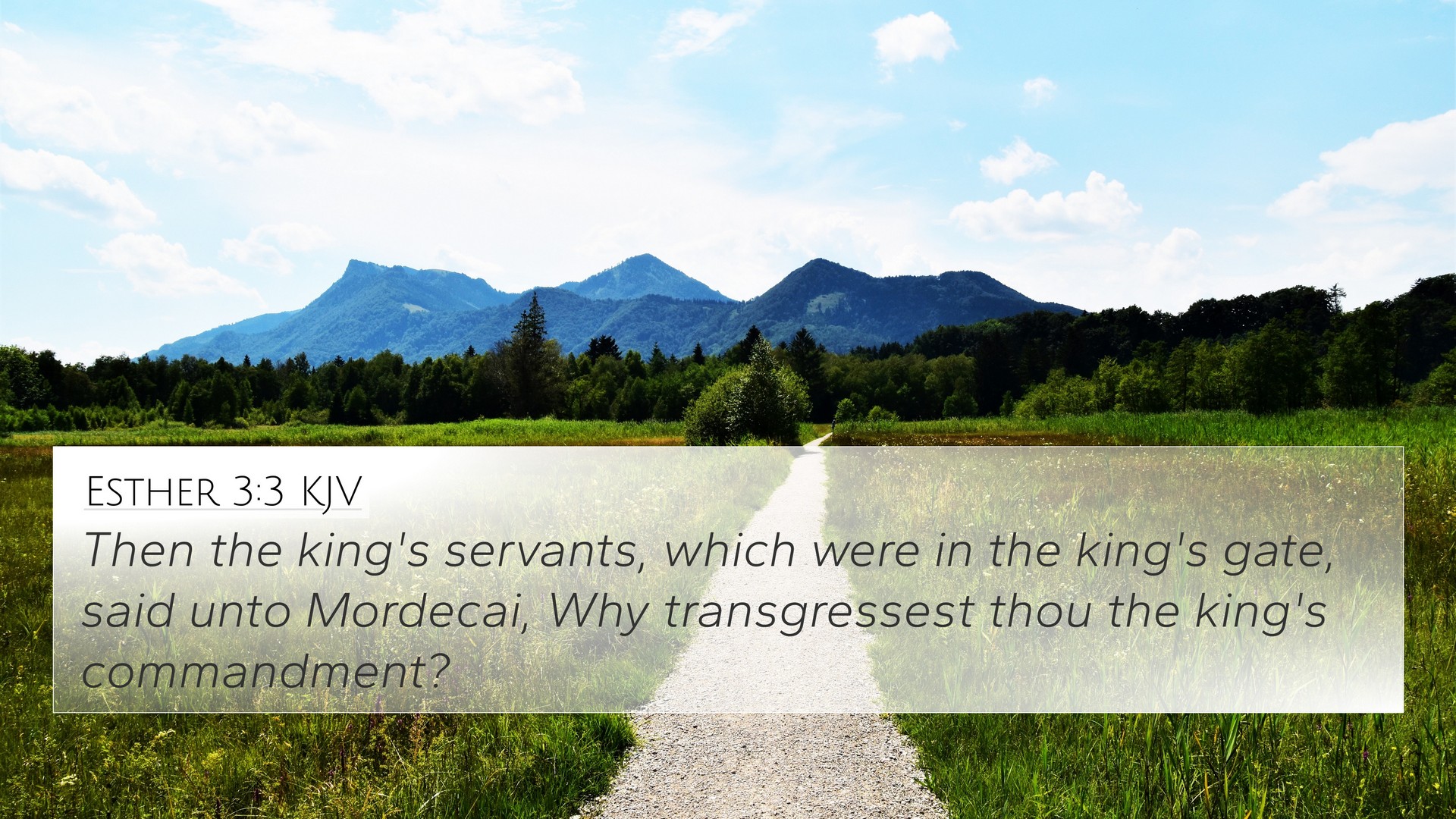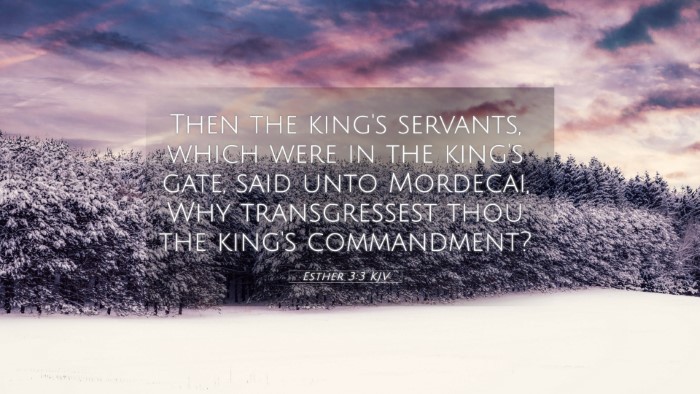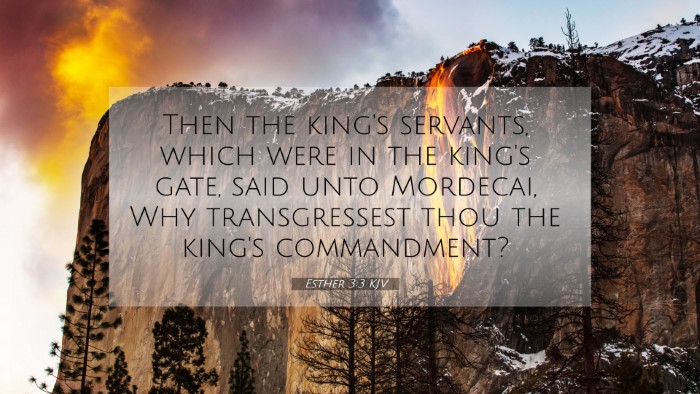Old Testament
Genesis Exodus Leviticus Numbers Deuteronomy Joshua Judges Ruth 1 Samuel 2 Samuel 1 Kings 2 Kings 1 Chronicles 2 Chronicles Ezra Nehemiah Esther Job Psalms Proverbs Ecclesiastes Song of Solomon Isaiah Jeremiah Lamentations Ezekiel Daniel Hosea Joel Amos Obadiah Jonah Micah Nahum Habakkuk Zephaniah Haggai Zechariah MalachiEsther 3:3 Similar Verses
Esther 3:3 Cross References
Then the king's servants, which were in the king's gate, said unto Mordecai, Why transgressest thou the king's commandment?
Uncover the Rich Themes and Topics of This Bible Verse
Listed below are the Bible themes associated with Esther 3:3. We invite you to explore each theme to gain deeper insights into the Scriptures.
Esther 3:3 Cross Reference Verses
This section features a detailed cross-reference designed to enrich your understanding of the Scriptures. Below, you will find carefully selected verses that echo the themes and teachings related to Esther 3:3 KJV. Click on any image to explore detailed analyses of related Bible verses and uncover deeper theological insights.
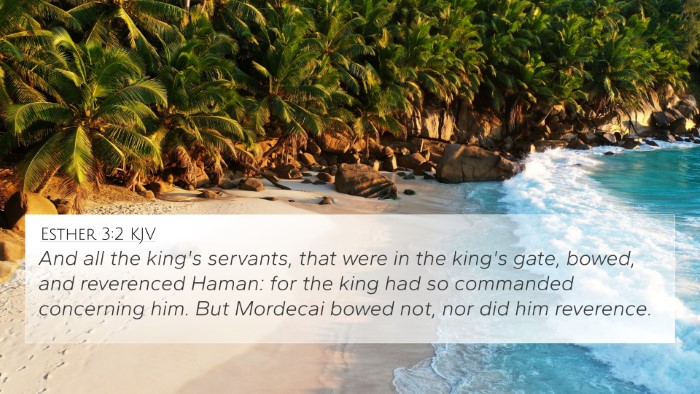
Esther 3:2 (KJV) »
And all the king's servants, that were in the king's gate, bowed, and reverenced Haman: for the king had so commanded concerning him. But Mordecai bowed not, nor did him reverence.
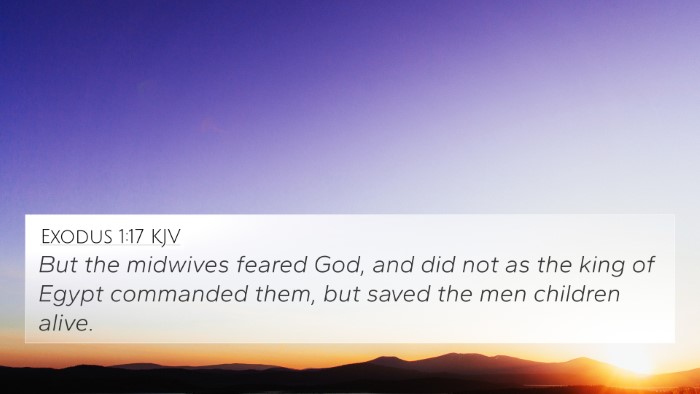
Exodus 1:17 (KJV) »
But the midwives feared God, and did not as the king of Egypt commanded them, but saved the men children alive.

Esther 2:19 (KJV) »
And when the virgins were gathered together the second time, then Mordecai sat in the king's gate.
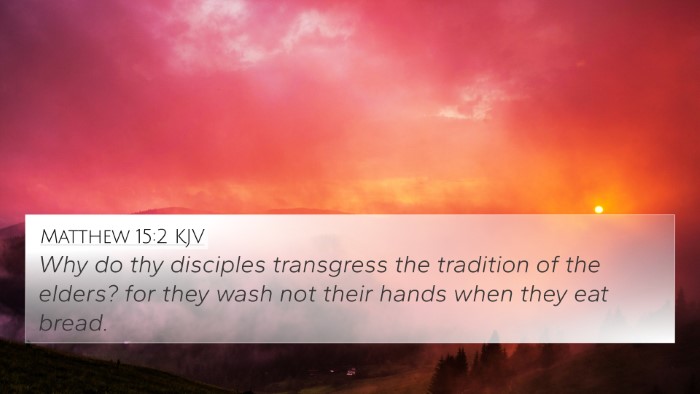
Matthew 15:2 (KJV) »
Why do thy disciples transgress the tradition of the elders? for they wash not their hands when they eat bread.
Esther 3:3 Verse Analysis and Similar Verses
Understanding Esther 3:3
Esther 3:3 states: "Then the king's servants, who were in the king's gate, said to Mordecai, 'Why do you transgress the king's command?'" This verse narrates a pivotal moment in the Book of Esther, where tensions between Haman and Mordecai begin to surface.
Overview
The events in Esther 3:3 set the stage for the ensuing conflict between Haman, an Agagite, and Mordecai, a Jew. Mordecai’s refusal to bow to Haman creates a crisis that embodies the larger themes of identity, loyalty, and divine providence.
Verse Meaning and Commentary
Matthew Henry’s Commentary
Henry elaborates on the significance of Mordecai's disobedience to Haman, emphasizing that it reflects a deeper adherence to his faith and identity as a Jew. This act of noncompliance was not merely a personal choice but an assertion of loyalty to God rather than man.
Albert Barnes’ Notes
Barnes points out the political implications of Mordecai’s refusal. He suggests that by not bowing to Haman, Mordecai took a stand that sparked a broader confrontation that would escalate into a significant threat against the Jewish people, illustrating how individual actions can have far-reaching consequences.
Adam Clarke’s Commentary
Clarke provides insights on the historical context behind the edict of the king and Haman’s agenda. He discusses the nature of the Persian court and the expectation of loyalty toward officials, interpreting Mordecai’s actions as subversive yet profoundly noble, embodying the struggle for judicial integrity within a foreign power.
Thematic Connections
This verse touches on several themes present throughout the Scriptures, including:
- The struggle for identity amidst cultural pressures (see Genesis 39:9 and Daniel 3:6)
- The power dynamics within rulership and authority (refer to Acts 5:29 and Romans 13:1)
- The divine orchestration of events to fulfill His purposes (see Proverbs 21:1 and Romans 8:28)
Cross-Referencing Biblical Texts
Esther 3:3 can be further understood through cross-references, illustrating connections between various biblical themes and narratives. Here are key verses that resonate with Esther 3:3:
- Exodus 20:5 - Discussion of idolatry and the command to worship God alone, reflecting Mordecai's loyalty.
- 1 Samuel 15:23 - The spirit of rebellion against God’s commandments, similar to Haman's actions.
- James 4:10 - Humbling oneself before God rather than men, akin to Mordecai's stance.
- Philippians 2:10 - Every knee shall bow, drawing attention to the ultimate authority of God over earthly powers.
- Hebrews 11:6 - The nature of faith and the rewards for those who earnestly seek God, akin to Mordecai’s faith.
- Revelation 6:9 - The suffering of God’s people for their faith, paralleling the imminent struggles faced by Mordecai and the Jews.
- Matthew 10:28 - The call to fear God more than man, echoing Mordecai's choice.
Conclusion
Esther 3:3 is a powerful example of standing firm in one’s beliefs amidst adversity. The various commentaries and cross-references provide a rich tapestry of understanding, highlighting the importance of faith and identity in the face of cultural challenges. Through careful study and cross-referencing, believers can better appreciate the interconnectedness of Scripture and its application in their lives.
